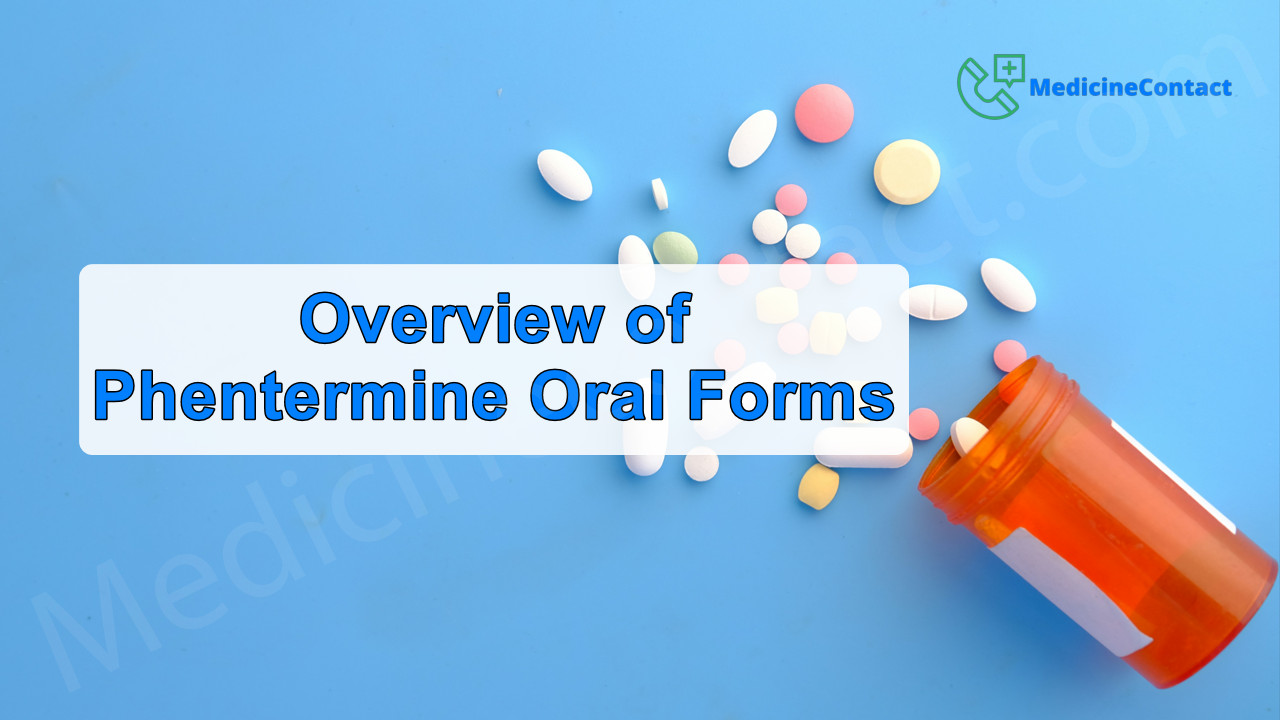
Introduction
Having trouble losing those extra pounds despite your best efforts? It's a common challenge, but there's a solution that might help: Phentermine. This guide will explore the various oral forms of Phentermine and how they can aid in weight loss.
Understanding the different forms of Phentermine is crucial in the context of weight management. Each form has unique characteristics and benefits, making it essential to know which one suits your needs best. From tablets to capsules, each type plays a role in helping you achieve your weight loss goals safely and effectively.
In this comprehensive guide, you'll gain:
- A detailed overview of Phentermine oral forms.
- Insights into how Phentermine works as a weight loss medication.
- Information about potential side effects and how to manage them.
- Guidelines for safe and effective use.
By the end of this article, you'll have a clear understanding of how Phentermine can be a valuable tool in your weight management journey.
Understanding Phentermine as a Weight Loss Medication
Phentermine is a prescription medication primarily used for weight loss. It belongs to a class of drugs known as anorectics, which function by suppressing appetite. As a stimulant related to amphetamines, phentermine works on the central nervous system to help reduce hunger, making it easier for individuals to consume fewer calories and lose weight.
FDA Approval and Regulation
The FDA (Food and Drug Administration) has approved phentermine for short-term use as an adjunct to a comprehensive weight management program that includes diet, exercise, and behavioral modification. This approval underscores its efficacy and safety when used under medical supervision. As a Schedule IV controlled substance, phentermine is regulated due to its potential for misuse and dependence.
Primary Uses for Weight Loss
Phentermine use for weight loss is targeted at adults with specific BMI categories:
- Adults with a BMI of 30 or higher: This category includes individuals classified as obese.
- Adults with a BMI of 27 or higher with associated health risks: These health risks can include conditions such as hypertension, diabetes, or hyperlipidemia.
Given its classification and prescribed usage parameters, phentermine serves as an effective tool in the arsenal against obesity when combined with lifestyle changes.
Exploring the Different Oral Forms of Phentermine
Phentermine comes in various oral forms, each designed to suit specific patient needs and preferences. Understanding these different formulations can help users and healthcare providers make informed decisions about weight management strategies.
1. Phentermine HCL 37.5 mg Oral Tablet
Phentermine HCL 37.5 mg oral tablet is one of the most commonly prescribed forms of this medication. Here's a closer look at what makes it unique:
Appearance and Packaging
- Appearance: The Phentermine HCL 37.5 mg tablet is usually a white, blue-speckled, oblong tablet. It often has identifying marks to distinguish it from other medications.
- Packaging: These tablets are typically packaged in bottles containing a specific number of doses, often ranging from 30 to 100 tablets per bottle, depending on the prescription requirements.
Indications for Use
Phentermine HCL 37.5 mg oral tablet is primarily indicated for adults with a body mass index (BMI) of:
- 30 or higher without accompanying medical conditions.
- 27 or higher with associated health risks such as hypertension, type 2 diabetes, or high cholesterol.
This dosage form is intended for short-term use, generally lasting from a few weeks to three months, depending on individual progress and physician recommendations. The goal is to help patients achieve significant initial weight loss while they adopt sustainable lifestyle changes.
Comparison with Other Dosages
The Phentermine HCL 37.5 mg oral tablet stands out compared to other dosages for several reasons:
- Effectiveness: This high-dose formulation is often chosen for its strong appetite-suppressing effects, which can be especially helpful during the early stages of weight loss.
- Convenience: Taking a single daily dose simplifies adherence to the treatment plan, making it easier for patients to incorporate into their daily routines.
However, lower dosages such as 8 mg, 15 mg, and 30 mg may be preferred in certain situations:
- These are often used when patients require gradual titration up to higher doses or when they experience side effects at the higher dosage.
Besides tablets, phentermine also comes in capsule form and orally disintegrating tablets (ODTs). These alternative forms can offer flexibility in administration:
- Capsules: Typically available in dosages like 15 mg and 30 mg. Capsules might be easier to swallow for some patients.
- Orally Disintegrating Tablets: Designed for those who have difficulty swallowing pills; these dissolve quickly on the tongue.
Choosing between different phentermine oral forms depends largely on individual patient needs, tolerance levels, and specific medical advice from healthcare providers.
Other Available Oral Forms
While the Phentermine HCL 37.5 mg oral tablet remains a popular choice due to its effectiveness and convenience, exploring other available forms such as capsules and orally disintegrating tablets provides additional options for personalized treatment plans. Understanding these alternatives ensures that patients receive the most appropriate form of phentermine for their unique circumstances.
This exploration highlights how diverse phentermine oral forms adapt to varied patient needs while maintaining a consistent focus on effective weight management strategies.
Knowing about these different phentermine oral forms is crucial for customizing weight loss treatments effectively. This knowledge empowers both patients and healthcare providers to choose the most suitable option based on individual requirements and clinical advice.
2. Other Available Oral Forms
Phentermine oral forms come in various preparations to cater to different patient needs and preferences. Beyond the Phentermine HCL 37.5 mg oral tablet, there are other notable versions:
Capsules
These are often preferred for their ease of swallowing. Capsules are available in multiple dosages, including 15 mg and 30 mg. They offer a controlled release, which can be beneficial for sustained appetite suppression throughout the day.
Orally Disintegrating Tablets (ODTs)
Designed for patients who may have difficulty swallowing pills. ODTs dissolve quickly on the tongue without the need for water, providing convenience and faster onset of action. Commonly known brands include Adipex-P and Lomaira. Adipex-P is typically available in 37.5 mg dosage, while Lomaira offers a lower dosage of 8 mg, which can be favorable for tailored dosing and minimizing side effects.
Each form has unique characteristics:
- Tablets: Standard, easy to split for dose adjustments.
- Capsules: Often provide a smoother ingestion experience.
- ODTs: Quick dissolution and absorption.
These varied forms enable healthcare providers to customize treatment plans according to individual patient needs, ensuring optimal results in weight management programs.
How Does Phentermine Work? A Look at Its Mechanism of Action
Phentermine is an effective weight loss medication because it acts as an appetite suppressant. It works through several complex mechanisms in the body to achieve this effect.
How Phentermine Suppresses Appetite
Phentermine primarily works by stimulating the central nervous system, similar to how amphetamines operate. This stimulation leads to the release of certain chemicals in the brain that contribute to appetite suppression. Here's a closer look at how phentermine functions:
- Central Nervous System Stimulation: Phentermine targets the hypothalamus, a part of the brain responsible for controlling hunger and fullness.
- Release of Neurotransmitters: It triggers the release of neurotransmitters like norepinephrine, dopamine, and serotonin. These chemicals are essential for regulating mood, energy levels, and appetite.
The Role of Neurotransmitters in Hunger Control
Understanding how phentermine works requires examining its interaction with neurotransmitters:
- Norepinephrine: This neurotransmitter increases alertness and energy expenditure while reducing hunger signals sent from the brain to the body. By boosting norepinephrine levels, phentermine helps diminish appetite and promotes a feeling of fullness.
"Phentermine's influence on norepinephrine essentially tricks your brain into thinking you're not hungry."
- Dopamine: Known for its role in reward and pleasure pathways, increased dopamine levels can enhance motivation and focus. When dopamine is elevated, individuals may experience reduced cravings for food.
"Elevated dopamine levels via phentermine use can help curb emotional eating by enhancing mood and satisfaction."
- Serotonin: This neurotransmitter contributes to feelings of well-being and happiness. By increasing serotonin levels, phentermine further aids in reducing appetite and improving mood.
"The boost in serotonin from phentermine use aids in creating a sense of well-being, which can be crucial for sustained weight management."
This multifaceted approach underscores why phentermine is considered an effective appetite suppressant. By modulating these key neurotransmitters, it helps individuals manage their weight by reducing their overall calorie intake.
Phentermine's precise mechanism is intricate but its impact on hunger regulation through these neurotransmitters offers valuable insight into its effectiveness as a weight loss aid.
How Long Phentermine Stays in Your System: What You Should Know
Knowing how long phentermine stays in your system is important for managing its effects and planning your weight loss strategy effectively. Several factors influence how long phentermine stays detectable in the body.
Factors That Affect How Long Phentermine Stays in Your System:
- Dosage: Higher doses of phentermine will typically remain in the system longer than lower doses.
- Metabolism: Individuals with faster metabolic rates may eliminate the drug more quickly.
- Age: Younger individuals generally process medications faster compared to older adults.
- Body Mass: Body fat composition can affect how long phentermine stays in your system, as the drug can be stored in fatty tissues.
- Frequency of Use: Regular, frequent use can lead to accumulation, prolonging detection time.
How Long Phentermine Stays in Your System Based on Different Forms and Dosages:
Phentermine comes in various oral forms like tablets, capsules, and orally disintegrating tablets. Common dosages are 8 mg, 15 mg, 30 mg, and 37.5 mg. The half-life of phentermine is about 20 hours, which means it takes around 20 hours for the concentration of the drug in the blood to reduce by half.
- Tablets (e.g., Phentermine HCL 37.5 mg): These are designed for immediate release, leading to quicker absorption and elimination from the body, usually within three to five days after the last dose.
- Capsules: These may have a slightly prolonged presence due to their formulation but generally follow a similar elimination timeframe as tablets.
- Orally Disintegrating Tablets (ODTs): These dissolve quickly in the mouth and are absorbed rapidly into the bloodstream. Their elimination period aligns closely with other immediate-release forms.
If you're wondering "how long does phentermine stay in your system", remember that while general timelines apply, individual experiences may vary. Always consult with a healthcare provider for personalized information based on your specific circumstances.
Regular monitoring by healthcare professionals ensures safe and effective use of phentermine across its various forms and dosages.
Navigating the Side Effects of Phentermine: What to Expect
When considering phentermine, understanding its side effects is crucial. This section delves into both mild and serious side effects, along with the potential psychological impacts.
Common Mild Side Effects
Phentermine is known to cause several common mild side effects. These can often be managed effectively with some simple strategies:
- Dry Mouth: One of the most frequently reported phentermine side effects. Staying hydrated by drinking plenty of water can help mitigate this issue.
- Insomnia: Difficulty sleeping is another common concern. Taking phentermine early in the day may reduce the likelihood of insomnia.
- Constipation: Increasing fiber intake through fruits, vegetables, and whole grains can alleviate constipation.
- Headaches: Over-the-counter pain relievers and adequate hydration may help manage headaches.
If these mild side effects persist or worsen, consulting a healthcare provider for further guidance is recommended.
Serious Side Effects
While less common, serious side effects require immediate medical attention:
- Increased Heart Rate: Phentermine can elevate heart rate. Monitoring pulse regularly and reporting significant changes to a healthcare provider is essential.
- High Blood Pressure: Regular blood pressure checks are crucial as phentermine may exacerbate hypertension.
- Primary Pulmonary Hypertension (PPH): Though rare, PPH is a severe condition characterized by increased blood pressure in the lungs' arteries. Symptoms include shortness of breath, chest pain, and fainting.
- Valvular Heart Disease: Another rare but serious condition where heart valves are damaged. Symptoms include fatigue, irregular heartbeat, and swelling in legs or feet.
Immediate medical intervention is critical if any of these serious side effects occur.
Understanding the Potential Psychological Effects of Phentermine Use
Phentermine's impact isn't limited to physical health; it can also affect mental well-being.
Anxiety and Mood Changes
Some users report experiencing anxiety or mood swings while taking phentermine. These psychological side effects are attributed to the drug's stimulant properties impacting neurotransmitter levels in the brain.
- Anxiety: Symptoms might include restlessness, nervousness, and irritability. Techniques such as mindfulness meditation or speaking with a therapist can be beneficial.
- Mood Swings: Fluctuations in mood may occur without warning. Keeping a mood journal to track patterns and triggers can be helpful in managing these changes.
For individuals with pre-existing mental health conditions, discussing these potential risks with a healthcare provider before starting phentermine is crucial.
Key Takeaways
Understanding both the physical and psychological impacts of phentermine ensures informed usage:
- Manage mild side effects like dry mouth and insomnia with hydration and proper timing of dosage.
- Monitor for serious side effects such as increased heart rate and high blood pressure; seek immediate medical attention if necessary.
- Be aware of potential psychological impacts, including anxiety and mood swings, and take proactive steps to manage them.
Through awareness and appropriate management strategies, many users successfully navigate the side effects associated with phentermine use. Additionally, exploring [wellness resources](https://
Weighing the Risks: Long-term Use of Phentermine for Weight Management
Using phentermine for extended periods comes with its own set of challenges that need careful thought and oversight. While it can be effective for short-term weight loss, using it for longer durations requires a deeper understanding of potential risks and ways to manage them.
Monitoring During Extended Treatment Periods
- Drug Dependence:
- Phentermine is a controlled substance, meaning there's a risk of abuse and dependence.
- Using it for too long can lead to both physical and mental dependency, so it's crucial to stick to the prescribed doses and timeframes.
- Cardiovascular Issues:
- Long-term use of phentermine has been linked to heart problems like increased heart rate and high blood pressure.
- Regular heart check-ups are essential to catch these issues early on.
Strategies to Minimize Risks
- Regular Check-ups:
- Frequent medical evaluations allow healthcare providers to monitor the patient's response to phentermine and make necessary adjustments.
- Blood pressure, heart rate, and overall cardiovascular health should be regularly assessed.
- Adherence to Guidelines:
- Following the prescribed dosage without deviation minimizes the risk of developing tolerance or dependence.
- Patients should avoid self-medicating or increasing doses without consulting their healthcare provider.
- Lifestyle Modifications:
- Incorporating lifestyle changes such as a balanced diet and regular exercise enhances the efficacy of phentermine while reducing reliance on the medication.
- Behavioral therapies can support sustainable weight loss habits, decreasing the need for long-term medication.
Understanding these risks highlights why it's so important to closely monitor anyone using phentermine oral forms for weight loss. This way, patients can get the most out of the medication while protecting themselves from potential long-term health issues.
Guidelines for Safe and Effective Use of Phentermine Oral Forms
Recommended Guidelines for Taking Phentermine Orally
For optimal results, it's crucial to adhere to the recommended guidelines when using phentermine. This weight loss medication should be taken as prescribed by your healthcare provider, typically once daily. Key points to consider:
- Timing: Phentermine is often recommended to be taken before breakfast or 1-2 hours after breakfast. This timing leverages its appetite suppressant effects throughout the day.
- Hydration: Always take phentermine with a full glass of water to facilitate proper absorption.
- Consistency: Maintain a regular schedule for taking your dose to ensure consistent therapeutic effects.
- Dosage: Do not increase the dose on your own. Follow the dosage instructions provided by your doctor, which typically range from 8 mg to 37.5 mg per day depending on individual needs and response.
The Role of Lifestyle Changes in Conjunction with Phentermine Treatment for Weight Loss Success
While phentermine can significantly aid in weight loss, its effectiveness is maximized when combined with lifestyle changes. Integrating healthy habits ensures sustainable weight management and overall well-being.
Key Lifestyle Changes:
Healthy Diet:
- Focus on a balanced diet rich in fruits, vegetables, lean proteins, and whole grains.
- Reduce intake of processed foods, sugary snacks, and high-fat items.
- Practice portion control and mindful eating to avoid overeating.
Regular Exercise:
- Incorporate both aerobic exercises (like walking, jogging, swimming) and strength training into your routine.
- Aim for at least 150 minutes of moderate-intensity exercise per week.
- Consistency is key; find activities you enjoy to maintain regular physical activity.
Behavioral Modifications:
- Establish regular meal times and stick to them.
- Keep a food diary to monitor your eating habits and identify areas for improvement.
- Seek support from friends, family, or weight loss groups for motivation and accountability.
Diet Centers That Use Phentermine:
Many diet centers incorporate phentermine into their weight loss programs under medical supervision. These centers provide structured plans that include nutritional guidance, physical activity recommendations, and behavioral support. Some well-known diet centers that may use phentermine include:
- Medi-Weightloss: Offers personalized weight loss programs including medical supervision and nutritional counseling.
- Dr. G’s Weight Loss & Wellness: Combines medical evaluations with customized diet plans and exercise recommendations.
Emphasis on the Importance of Incorporating a Healthy Diet and Regular Exercise
Effective long-term weight management with phentermine hinges on combining the medication with lifestyle modifications. Relying solely on the medication without making necessary lifestyle changes can lead to suboptimal outcomes and potential regain of lost weight once treatment ceases.
Phentermine works best as part of a comprehensive weight loss strategy:
- Maintain an active lifestyle through regular exercise.
- Follow a nutritionally balanced diet tailored to your caloric needs and health goals.
- Engage in ongoing behavioral changes that promote healthy living habits.
By integrating these elements, individuals enhance their chances of achieving sustained weight loss success while mitigating potential risks associated with long-term phentermine use.
Explore More: For more information on how Weight management strategies work hand-in-hand with medications like phentermine, visit our detailed guide on Weight.
Comparative Analysis: How Does Phentermine Stack Up Against Other Weight Loss Medications?
When evaluating weight loss medications, it's essential to compare phentermine with other drugs like Adderall and Contrave. Each medication has distinct characteristics affecting efficacy, safety profiles, and potential interactions.
Efficacy
Phentermine
Known for its potent appetite-suppressing effects, phentermine is typically prescribed short-term. It helps individuals with a high BMI achieve significant weight loss when combined with lifestyle changes.
Adderall
Although not primarily prescribed for weight loss, Adderall (a combination of amphetamine salts) can lead to appetite suppression as a side effect. Its primary use is for ADHD, making it less suitable for long-term weight management.
Contrave
A combination of bupropion and naltrexone, Contrave targets both appetite and cravings. This dual-action mechanism can be effective for sustained weight loss over more extended periods.
Safety Profiles
Phentermine
As a Schedule IV controlled substance, phentermine carries the risk of dependency and various side effects such as increased heart rate and high blood pressure. It's generally not recommended for individuals with certain preexisting conditions.
Adderall
Also a Schedule II controlled substance due to its higher potential for abuse. Adderall's side effects include cardiovascular issues and psychological dependence, making it less desirable solely for weight loss.
Contrave
While not classified as a controlled substance, Contrave has its own set of side effects like nausea and headaches. It may also be contraindicated in individuals with specific mental health or seizure disorders.
Potential Interactions
Phentermine
Can interact with other medications like SSRIs and MAO inhibitors. It's crucial to consult healthcare providers to avoid adverse effects.
Adderall
Has a high interaction potential with other stimulant medications and some antidepressants. Monitoring by a healthcare professional is essential.
Contrave
Interacts with opioids (due to the naltrexone component) and various psychiatric medications. Careful medical supervision is needed during treatment.
Understanding how these medications compare helps in making informed decisions about weight loss strategies tailored to individual needs and medical histories.
Exploring Diet Centers That Use Phentermine for Weight Loss
When looking into ways to lose weight, some diet centers use phentermine in their programs because it's known to help with weight loss. These centers usually take a holistic approach, combining the medication with lifestyle changes for the best results.
Types of Clinics and Programs
Here are some well-known clinics and programs that include phentermine in their weight management services:
- Medical Weight Loss Clinics: These clinics have licensed healthcare providers who prescribe phentermine after a thorough medical evaluation. Patients receive personalized support, including dietary advice, exercise plans, and regular follow-up appointments to monitor progress.
- Bariatric Centers: Often associated with hospitals or specialized medical facilities, these centers offer phentermine as part of a broader bariatric treatment plan. This may include nutritional counseling, behavioral therapy, and sometimes surgical options for more severe cases of obesity.
- Online Telehealth Services: With the rise of telemedicine, some platforms now offer virtual consultations where patients can be evaluated and prescribed phentermine if deemed appropriate. These services often include digital tools for tracking diet, exercise, and medication adherence.
Benefits of Using Phentermine in Weight Loss Programs
Including phentermine in a structured weight loss program has several advantages:
- Enhanced Supervision: Regular check-ins with healthcare professionals ensure that the medication is used safely and effectively.
- Comprehensive Support: Combining medication with dietary changes and physical activity maximizes weight loss potential and promotes long-term healthy habits.
- Tailored Treatment Plans: Programs are often customized to meet individual needs, taking into account personal health history and weight loss goals.
Phentermine's role in these settings shows its value as a tool in medically supervised weight management. For those seeking professional guidance on their weight loss journey, exploring diet centers that use phentermines can be an effective strategy to achieve desired outcomes while ensuring safety and efficacy.
Conclusion
Understanding the various Phentermine oral forms is crucial for anyone considering this medication for weight management. Here are the main types:
- Phentermine HCL 37.5 mg Oral Tablet: A widely prescribed form due to its potent dosage.
- Other Available Oral Forms: Including capsules and orally disintegrating tablets, each offering unique benefits and usage guidelines.
Phentermine's effectiveness as a weight loss aid depends on correct usage, which must be paired with lifestyle changes such as a healthy diet and regular exercise. Awareness of potential side effects and the importance of medical supervision are key factors in ensuring safe and effective treatment.
Explore more about the weight management options available with Phentermine under your healthcare provider's guidance.
FAQs (Frequently Asked Questions)
What is Phentermine and how is it used for weight loss?
Phentermine is a prescription medication classified as an anorectic agent, primarily used for weight loss in adults with specific BMI categories. It functions by suppressing appetite, making it easier for individuals to adhere to a weight management plan.
What are the different oral forms of Phentermine available?
Phentermine is available in various oral forms, including tablets, capsules, and orally disintegrating tablets. The most common dosage is the Phentermine HCL 37.5 mg oral tablet, but there are other formulations like Adipex-P and Lomaira that have distinct characteristics and benefits.
How does Phentermine work in the body?
Phentermine works as an appetite suppressant by affecting neurotransmitters in the brain that regulate hunger. This mechanism helps reduce food intake and supports weight loss efforts when combined with lifestyle changes.
What are the potential side effects of using Phentermine?
Common mild side effects of Phentermine include dry mouth and insomnia. Serious side effects may involve increased heart rate and high blood pressure, which require immediate medical attention. It's also important to be aware of potential psychological effects such as anxiety and mood changes.
How long does Phentermine stay in your system?
The duration that Phentermine remains detectable in the body can vary based on factors such as dosage and individual metabolism. Generally, its effects can last several hours, but the exact detection time may differ depending on the form taken.
What guidelines should be followed for safe use of Phentermine?
For optimal results, it is recommended to take Phentermine orally before meals at specific times. Additionally, incorporating a healthy diet and regular exercise alongside Phentermine use is crucial for effective long-term weight management outcomes.
Disclaimer: This article is for informational purposes only and does not constitute medical advice. Always consult with a healthcare professional before starting any new treatment regimen.




